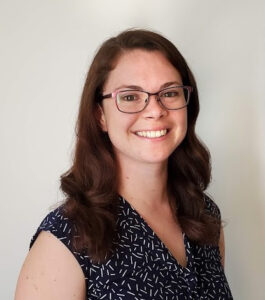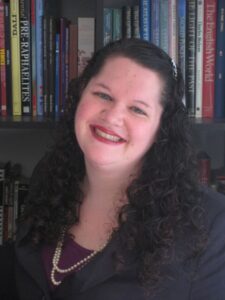
I’ve always enjoyed figuring out how things work. My background is in biomedical engineering, where I did my PhD in maternal vital sign monitoring and then worked in anaesthetic brainwave monitoring. I’ve observed first-hand the complexity of human bodies as I’ve analysed brainwaves to try and understand the neural mechanisms of consciousness. It is remarkable how much science has allowed us to discover and understand about the human body.
I’m currently working as a postdoc on the John Templeton Foundation grant on human flourishing and science-engaged theology at Carey Baptist College, New Zealand. I investigate ways that the cognitive sciences can partner with theology to help us understand how a human person can flourish. Part of my hope with this work is to exemplify the complementary relationship of science and theology, since I’ve found that, at the popular level, many people still think the two disciplines conflict with each other (and wonder why someone with a science background would become a theologian!). One topic I’ve become interested in is how cognition affects how people conceive of God, which is part of the discipline of Cognitive Science of Religion. I want to be aware of what biases might be influencing my relationship with God so that, if possible, I can overcome them to flourish and help others to flourish too. This blog post is a summary of what I’ve been learning in this domain.
A key concept in cognitive science is “cognitive biases” – an intuitive or default way of thinking when a person is processing and interpreting the world. Cognitive biases are not necessarily bad or faulty, but are about what happens naturally or automatically, such as the bias of a mother to love her child. One such cognitive bias is anthropomorphism, the tendency to attribute human features to nonhuman beings. Have you ever seen a face in the clouds? Or thought that your plant is looking sad? Anthropologist Stewart Guthrie proposes that our understanding of humans is so important to understanding the world around us, that people will find the anthropomorphism of God difficult to resist.[1] Studies have confirmed that, yes, adults intuitively attribute humanlike qualities to God.[2] For instance, humans tend to conceive of God needing to enter the room to be present with them, imagine that God has arms in which to hold them and a voice that can be heard. Indeed, anthropomorphic language for God is prolific in the Christian Scriptures and many other world religions.
Teleological reasoning is another cognitive bias. It’s the “Why, God?” question, the tendency to look for purpose in experiences or events, the insistence that it must have happened for a reason! For instance, after the 2011 tsunami in Japan, Tokyo Governor Shinatro Ishihara told reporters that the disaster was “divine punishment” because the Japanese people had become egotistic and greedy.[3] He was looking for purpose in a devastating event. (However, later he retracted his remarks due to public criticism). A month later a Public Religions Research Institute poll reported that 38% of Americans surveyed believed that natural disasters, such as the Tsunami in Japan, were a sign from God. Humans tend to want events to have a purpose.
Although cognitive biases may be intuitive and natural, we must keep in mind the extent to which they are true and helpful. If, for those who believe in a God, we only conceive of God having human-like qualities, then we can limit our understanding and appreciation of God’s power. We need to be aware of our cognitive biases and proceed with caution when they are not true and helpful.
Another key concept in Cognitive Science of Religion is ‘mindreading’ or the Theory of Mind. Did you know that humans can mindread? Unfortunately, this isn’t the telepathic ability that features in many sci-fi movies (although that would be an interesting superpower!), but the ability to infer what others are thinking, feeling, or believing from their eye gaze, facial expressions, body language, gestures, or tone of voice. By the age of 5, children can predict what another is thinking. [4] The higher-order Theory of Mind adds another step and asks, “What do I think you think I’m thinking?” (instead of “What do I think you’re thinking?”). Mindreading is thought to have given an evolutionary social advantage because it allowed humans to know who had reliable information and could be trusted.[5] Neurotypical adult humans mindread constantly to communicate, cooperate, navigate social situations, and think morally. Even though this version of mindreading is far from paranormal, the extent that humans mindread is unique among the animal kingdom.
The Theory of Mind has been employed as one of the main psychological explanations for relationality in theological anthropology’s recent turn to relationality. For instance, Justin Barrett and Matthew Jarvinen argue that to be in the image of God is to have a higher-order Theory of Mind since this is what makes I-Thou relationships possible.[6] The caution here is to consider who may be excluded from this kind of relating. Autistic persons often have trouble anticipating what another is thinking, and thus could be excluded from normative theological statements based on the Theory of Mind.[7] Joanna Leidenhag reviews several theologians who exclude autistic persons, exposing that the “theological move from rationality to relationality does not escape the logic of exclusion, but only changes the group of human beings who are excluded.”[8] Autistic persons can have rich relationships with God, illustrating how caution needs to be had in bringing the Theory of Mind into divine-human relationships.
The Theory of Mind together with cognitive biases can tell us several things about how people might hear from/perceive God. Firstly, it is natural for neurotypical people to conceive of God as a humanlike agent and expect to hear from God as they would from a human. For people within church contexts, sermon illustrations that are metaphorical or use our imagination are therefore likely to be effective. However, we must keep in mind that it is humans that were made in God’s image, not the other way around, so we must not limit our understanding of God to our conceptions of him as a human, or limit hearing from God to the way we would mindread a human.
Secondly, if God exists, people have cognitive biases such as teleological reasoning that help them understand God’s mind. However, this also means people may infer purpose that is not true. Caution and testing are needed (such as, comparing these experiences to Scripture, Church teachings, and the local ecclesial body).
Thirdly, we must be wary of using a scientific theory to make normative theological statements. The Theory of Mind can help us understand how neurotypical people relate with each other and to God, but since it tends to exclude autistic persons, it cannot be the only explanator for human relationality. Instead, we need to ask how the Theory of Mind is not helpful, or could be nuanced, and develop other relational theories.
My hope is that by better understanding how humans tend to think will help us understand how many people conceive of God and to flourish more fully in this relationship as a result.

Rebecca is a postdoctoral researcher in science-engaged theology at Carey Baptist College, Aotearoa. Her background is in biomedical engineering and now she brings her love of the medical sciences into conversation with theology. She enjoys wrestling with how science can aid our understanding of who God is and who we are as human persons. She is passionate about journeying alongside people as they engage with theological ideas and making science accessible to the church.
[1] Stewart E Guthrie, “A Cognitive Theory of Religion,” Curr. Anthropol. 21.2 (1980): 181; D. Jason Slone and William W. McCorkle Jr., eds., The Cognitive Science of Religion: A Methodological Introduction to Key Empirical Studies (London: Bloomsbury Academic, 2019), 16.
[2] Justin L Barrett and Frank C Keil, “Conceptualizing a Nonnatural Entity: Anthropomorphism in God Concepts,” Cognit. Psychol. 31 (1996): 219–47.
[3] Devin Dwyer, “Divine Retribution? Japan Quake, Tsunami Resurface God Debate,” 19 March 2011, https://abcnews.go.com/Politics/japan-earthquake-tsunami-divine-retribution-natural-disaster-religious/story?id=13167670.
[4] Justin L. Barrett, Rebekah A. Richert, and Amanda Driesenga, “God’s Beliefs versus Mother’s: The Development of Nonhuman Agent Concepts,” Child Dev. 72.1 (2001): 50–65, https://doi.org/10.1111/1467-8624.00265.
[5] Justin L. Barrett and Pamela Ebstyne King, Thriving with Stone Age Minds: Evolutionary Psychology, Christian Faith, and the Quest for Human Flourishing (Downers Grove: IVP Academic, 2021), 61.
[6] Justin L. Barrett and Matthew Jarvinen, “Cognitive Evolution, Human Uniqueness, and the Imago Dei,” in The Emergence of Personhood: A Quantum Leap?, ed. Malcolm Jeeves (Grand Rapids: William B. Eerdmans, 2015), 171.
[7] Joanna Leidenhag, “The Challenge of Autism for Relational Approaches to Theological Anthropology,” Int. J. Syst. Theol. 23.1 (2021): 122, https://doi.org/10.1111/ijst.12453.
[8] Leidenhag, “The Challenge of Autism for Relational Approaches to Theological Anthropology,” 125.
















